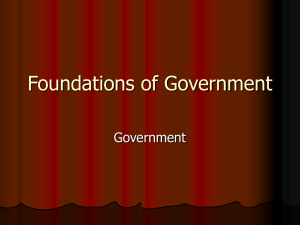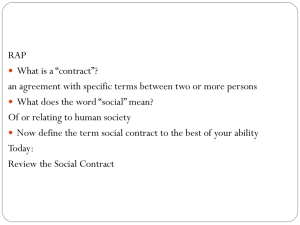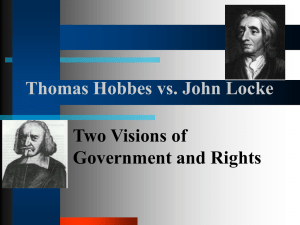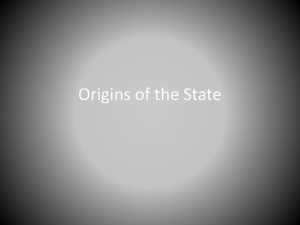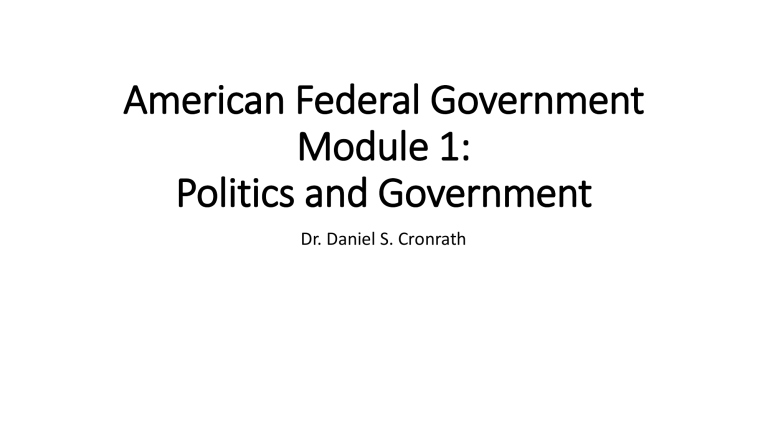
American Federal Government Module 1: Politics and Government Dr. Daniel S. Cronrath What is Politics? • There are many definitions of politics. • Harold Lasswell: “Determining who gets what, when, where, and how in society.” • George Agbango: “Bloodless conflict.” • For our purposes, let’s define politics as the actions or activities concerned with achieving and using power in a country or society. • Political Power is the power over another person to get them to do something they wouldn’t otherwise do. We All Do Politics • You may so, “I don’t do politics?” Well… • Of course you do! We all have since we were young. As adults, we are consistently trying to convince people to do things that benefit us. • Tip O-Neill is attributed with saying “All politics is local.” Is this still true day? If so, how? • We all have the ability to exercise political power! Government • So what is government? Government is a political system by which a country or community is administered. • Government impacts our lives every day and in countless ways. What are some ways both obvious and subtle? • Throughout most of human history people have been ruled by oppressive governments rather than selfgoverned. Origins of Government • Aristotle is often called the father of political science. • Aristotle believed that the city was of greater importance than the household. Why? Because in his view the household is only a part of the city as a whole and the health of the community is more important than that of the individual. • Aristotle believed the study of politics included three areas of importance: Types of government, the politician and statesman, and the citizens. More Aristotle – Relevance Today • For any regime to endure, Aristotle saw education of the people as a requirement and believes lawmakers should stress education of the youth above all else. He believed education would allow citizens to better serve the common good of the city. Aristotle believed also in a well-rounded education including physical education and the arts. • Aristotle was an advocate for a strong middle class in society. Why? He saw the middle class as being more virtuous than the wealthy or poor. He believed the middle class would be free from the arrogance of the wealthy but not being envied by the poor. He also saw the middle class ready to obey reason. Aristotle’s Types of Government One Some Many For the Common Interest “True Forms” Monarchy Aristocracy “the Best” Polity* For the Interest of the Ruler(s) “Corrupted or Perverted Forms” Tyranny (the worst form of government) Oligarchy “the Few” Democracy *Polity: An ideal democracy that governs for the interests of all, not just the leadership. The State of Nature and the Social Contract • One school of thought teaches that social contract theories precede the creation of government. A social contract is an implicit agreement among the members of a society to cooperate for social benefits. What necessitates a social contract? • In his book Leviathan in 1651 near the end of the English Civil War, philosopher and scholar Thomas Hobbes writes about the state of nature. In his view, people in this state have absolute freedom, being able to do whatever they want. But people’s lives are solitary, poor, nasty, brutish, and short. • Hobbes believed in a social contract in which it was necessary to give up absolute freedom for safety and security to an all-powerful King. This complete subjugation would be beneficial and be superior to total absence of government is anarchy. The State of Nature and the Social Contract • John Locke built on Hobbes work agreeing with him in some core respects but disagreeing with Hobbes especially on man’s state of nature. • Locke believed people had natural rights or basic human rights. This words should sound familiar to you as Locke wrote about man’s innate rights to Life, liberty, and property from their Creator. • Locke believed people are born with certain ethically principles that reveal a natural law or behavior that protect our natural rights. • The concept of liberty, that all people can and should live free from oppression, stems from this belief. The State of Nature and the Social Contract • John Locke made some extraordinary contributions to humankind primarily in three areas: • Religious tolerance and freedoms, • Civil liberties and governance, and • His views on parenting and education. • Locke believed people were capable of governing themselves and critical to his belief in liberty, Locke espoused a limited government meaning people do give up some freedoms for safety and security but retain most of their rights. Hobbes v. Locke Hobbes v. Locke Question Hobbes Locke Do They Agree? The Original State of Humankind State of Nature (war for Hobbes) Yes Divine Right or Social Contract? Social Contract Yes Compare (How Are They Similar?) Question Hobbes Locke Do They Agree? Why Government? To Protect Us from Ourselves To Protect Natural Rights No! Where Does Sovereignty Reside? The Monarch The People No! Can a Government’s Power Be Limited? NO (absolutism) YES (constitutionalism) No! Right of Revolution? NO YES if government fails No! Contrast (How Do They Differ?) The State of Nature and the Social Contract • Jean Jacques Rousseau was different than the other two social contract theorists. He believed in the implementation of a government responsive to the general will and direct democracy. • Believed humanity is inherently virtuous and this extended into his views on education and childrearing. In Emile, he believed if we let children play, be happy, and protect them from negativity, they will become people virtuous adults. • Rousseau never used the term noble savage but he was influenced by the European preoccupation with native Americans. Believed humankind is undone through self-love “amour proper”. • Rousseau was ahead of his time decrying consumerism was a protosocialist. Locke v. Rousseau Locke v. Rousseau Locke Rousseau Tabula Rasa “a clean slate” Inherent Virtue Freedom is to do as one wills and make choices Freedom is the triumph of reason over instinct Private property predates the Social Contract Private property creates the Social Contract The purpose of the social contract is to protect the natural rights of citizens which life, liberty, and property The purpose of the social contract is to create a government that represents the people as a whole and implements the general will. A government is legitimate if it follows a specific contract that was ratified by an agent of the people. A government is legitimate if it generally enacts what is popular with the general will of the most people. INDIVIDUALIST PROTO-SOCIALIST or Radical Democracy One enters into the Social Contract prepared to give up specific freedoms in exchange for the guarantee of my remaining freedoms. One enters into the Social Contract prepared to submit to the general will, as it is the best guarantee of social harmony. Democracy • Democracy is predicated on self-determination, the ability of people to make decision for themselves. There are two kinds of democracy: • Direct democracy: People participating directly in government (Rousseau) • Representative democracy: Selecting other people to make decisions on their behalf (Locke) • A republic is form of government in which a state is ruled by representatives of the citizen body. ... Because citizens do not govern the state themselves but through representatives, republics may be distinguished from direct democracy. • The United States is both democratic and a constitutional republic meaning the people and their representatives have sovereign power. Political Culture • Democratic institutions, governments, laws and values are reflective of people’s political culture. A political culture is how nations and communities come to understand their politics and government as unique to them. • The late political scientist Lucian Pye define it as the composite of basic values, feelings, and knowledge, which underlie the political process. One thing certain is that political cultures vary from nation-to-nation, state-to-state, community-to-community, tribe-to-tribe. American Exceptionalism • American exceptionalism is the belief (myth) that America has superior qualities that set it apart from other nations. They include: • Equality: The state in which all people have the same status, rights, and opportunities. The same chance at realizing the American dream. • Individualism: This belief emphasizes the moral worth and responsibility of the individual in society • Due process of law: The guarantee that everyone in a society receives fair treatment under the law. Equality v. Equity v. Justice Reality v. Equality v. Equity v. Justice The Future of American Democracy • So what are some challenges facing American democracy today and in the future? • Multiculturalism v. Nationalism • Multiculturalism is the fusion of different people, beliefs, and cultures that has helped America become the world’s greatest political and economic force in history. • Nationalism is the belief that the values of any one nation are of greater importance than accepting the beliefs or people of other nations. • Immigration has caused friction since we were colonies and will continue to in the future. The Future of American Democracy • What is the nature of American capitalism? Capitalism is an economic system that says people should be able to produce, sell, and trade with limited government regulation. • A belief in capitalism has helped build America in the world’s sole economic and political superpower. However there are also threats from unregulated capitalism, or the belief in no government control over free markets or industries. This stands in contrast to limited regulation capitalism in which government works to restrain capitalism and protecting it from its own excesses. • The lack of economic regulation leads to income inequality, when a nation becomes dominated by the wealthy or elites in a society and elected officials ignoring their constituents, the people elected-officials represent . Conclusion • We all do politics and government affects our lives on a daily basis. We are all political animals! • America is a democratic republic that values equality, individualism, and protections under the rule of law. • America has serious political, economic, and moral challenges that must be corrected in order to meet its own stated ideals. • America is imperfect yet most Americans aspire to expand the concepts of liberty to all people.



